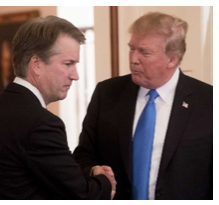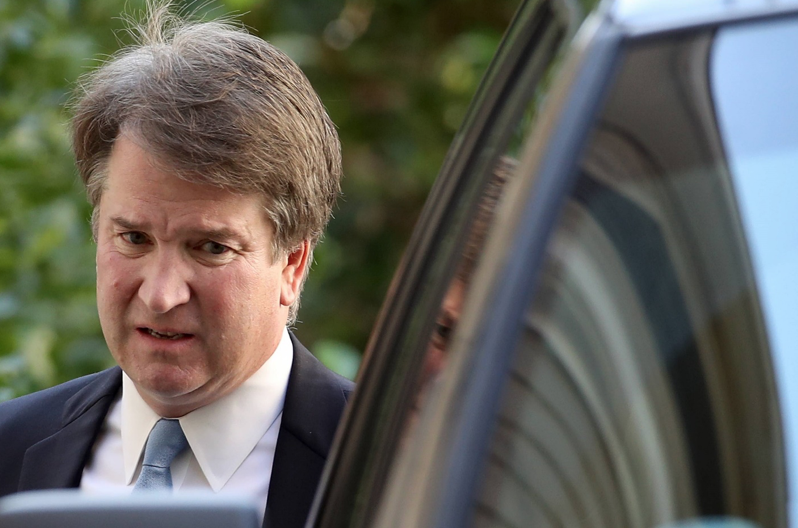CommentsPERSPECTIVE--Christine Blasey Ford, the woman who has accused Brett Kavanaugh of sexual assault in 1982, is set to testify Thursday on the matter before the Senate Judiciary Committee.
Kavanaugh, who has denied the allegations, as well as those of a second accuser, will testify after.
Kavanaugh is, at this point, a damaged nominee. President Donald Trump claims he is standing by Kavanaugh and has no plans to pull the nomination, although such a move wouldn't be totally without precedent:
- In 1987, Ronald Reagan withdrew Douglas Ginsburg from consideration as a Supreme Court justice a little more than a week after nominating him, after stories of Ginsburg smoking marijuana with his students in the 1970s surfaced.
- George W. Bush withdrew Harriet Miers' nomination a few weeks after appointing her in October of 2005. Miers was White House counsel and a longtime close friend of Bush's, but she appeared unqualified for the position and her confirmation seemed to be in doubt.
- Barack Obama withdrew the nomination of former Senate Majority Leader Tom Daschle for secretary of health and human services in 2009 when stories of unpaid taxes surfaced.
- In 1993, Bill Clinton withdrew two nominees, Zoe Baird and Kimba Wood, for attorney general, following revelations that both had hired undocumented workers.
Now, perhaps some of the names mentioned above might have gotten through their respective confirmation processes. But, in each case, the sitting president chose to sidestep those battles.
Those withdrawals are all based on the idea of "political capital." The Constitution places presidents in a fundamentally weak position relative to Congress. They require the Senate's approval to place people in high-profile positions. Having a Senate controlled by the president's own party makes this easier, but approval is still no guarantee. (In the above examples, Bush, Obama, and Clinton faced struggles with Senates controlled by their own party.)
Presidents are assumed to possess a certain amount of political capital, which they can, in turn, spend on any issue or appointment they deem important. This is obviously a vague concept, but it seems to be related to presidential popularity, and to their ability to credibly claim a mandate from their last election. Members of Congress are willing to do a fair amount for the president, but granting him too much can imperil their own careers and legislative agendas. This is especially true when the president is unpopular. Expending capital in one arena also seems to limit the amount available to spend in others; presidents tend to be cautious in where they allocate their resources, lest they squander their own goals.
When Trump first nominated Kavanaugh in July, it seemed a smart political move. Kavanaugh was conservative and well-credentialed. It seemed an easy vote for Republican senators to make going into the mid-term elections. In light of the sexual assault allegations by Ford, however, Kavanaugh's nomination appears in doubt. Indeed, it's putting pressure on more moderate Republican senators to defect from their caucus. If there's one thing a Supreme Court nomination should not do, it's split the president's own party.
 And Kavanaugh has become remarkably unpopular for a court nominee. That's not to say the senate won't confirm him, but it does mean there's little political benefit for doing so, for senators or the president. Indeed, Republican senators have spent the last week issuing statements in Kavanaugh's defense—and those statements will likely be used as effective fundraising appeals against them for many years to come, regardless of the outcome of this nomination.
And Kavanaugh has become remarkably unpopular for a court nominee. That's not to say the senate won't confirm him, but it does mean there's little political benefit for doing so, for senators or the president. Indeed, Republican senators have spent the last week issuing statements in Kavanaugh's defense—and those statements will likely be used as effective fundraising appeals against them for many years to come, regardless of the outcome of this nomination.
A different president may well have withdrawn Kavanaugh's nomination by now. There's no shortage of similarly credentialed judges with similar ideological positions for Trump to nominate (and there would still be time to seat one on the court before this Senate adjourns).
But Trump is far less risk-averse than most past presidents and seems to feel little concern about expending political capital—probably because there are few other areas in which he can, or would want to, spend it. Trump barely had a legislative agenda coming into office, and he hasn't articulated much of one for the future. He's already unpopular and not likely to make many gains in popularity by abandoning Kavanaugh at this point. Members of his base, who generally defend the sexual assault Kavanaugh is denying, are happy for Trump to continue with this fight, and Trump likes keeping them happy.
But it's clear that the Kavanaugh nomination has become a politically damaging moment for Republicans going into an election that was already looking challenging for them. For the GOP, Trump's instinctive belligerence is making a bad situation worse.
(Seth Masket, a Pacific Standardcontributing writer, is a political scientist at the University of Denver, specializing in political parties, state legislatures, campaigns and elections, and social networks. This perspective was posted first at Pacific Standard.)
-cw
















